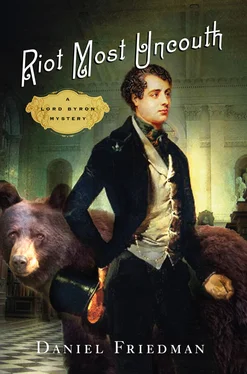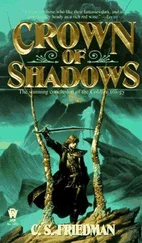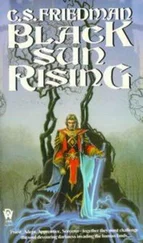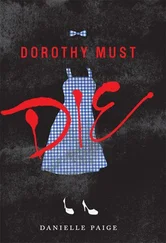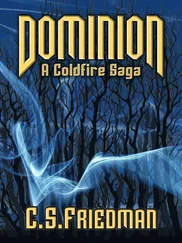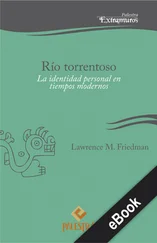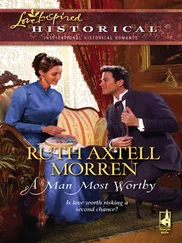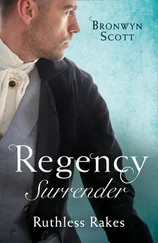Daniel Friedman - Riot Most Uncouth
Здесь есть возможность читать онлайн «Daniel Friedman - Riot Most Uncouth» весь текст электронной книги совершенно бесплатно (целиком полную версию без сокращений). В некоторых случаях можно слушать аудио, скачать через торрент в формате fb2 и присутствует краткое содержание. Год выпуска: 0101, ISBN: 0101, Издательство: St. Martin, Жанр: Исторический детектив, на английском языке. Описание произведения, (предисловие) а так же отзывы посетителей доступны на портале библиотеки ЛибКат.
- Название:Riot Most Uncouth
- Автор:
- Издательство:St. Martin
- Жанр:
- Год:0101
- ISBN:9781250027580
- Рейтинг книги:5 / 5. Голосов: 1
-
Избранное:Добавить в избранное
- Отзывы:
-
Ваша оценка:
- 100
- 1
- 2
- 3
- 4
- 5
Riot Most Uncouth: краткое содержание, описание и аннотация
Предлагаем к чтению аннотацию, описание, краткое содержание или предисловие (зависит от того, что написал сам автор книги «Riot Most Uncouth»). Если вы не нашли необходимую информацию о книге — напишите в комментариях, мы постараемся отыскать её.
Riot Most Uncouth — читать онлайн бесплатно полную книгу (весь текст) целиком
Ниже представлен текст книги, разбитый по страницам. Система сохранения места последней прочитанной страницы, позволяет с удобством читать онлайн бесплатно книгу «Riot Most Uncouth», без необходимости каждый раз заново искать на чём Вы остановились. Поставьте закладку, и сможете в любой момент перейти на страницу, на которой закончили чтение.
Интервал:
Закладка:
The thrall, according to texts, will lure or force victims into the vampire’s lair, and bleed them so the master may feed at its leisure. If circumstances require it, this wretched mortal servant will happily die to protect the monster. This revelation made it clear to me that Knifing was a vampire after all, and that he’d fabricated the story about the killer and the King, and had sacrificed his minion in furtherance of the lie.
If this supposition was correct, poor, innocent Angus had been a scapegoat for a scapegoat, and my lies about his death had insulated and protected the deeper lies that Knifing told me.
I spent a lot of time thinking about vampires’ supposed allergy to sunlight, and about how Knifing had carried an umbrella when the sky bore no signs warning of rain, and how he shaded his pale skin with his wide-brimmed bush hat when he went about in the daytime. And I began to make certain inquiries.
According to public records, which my attorney, Mr. Hanson, assisted me in researching, Archibald Knifing disappeared in 1809. His house was found empty, and he had apparently informed no one of his whereabouts. After a reasonable time, it was assumed he had died while traveling abroad, and his affairs were disposed of according to the law. Since Mr. Knifing left no will and the court could find no heirs, the property reverted to the Crown and was sold at auction.
I will protect the current inhabitants by not revealing their names or the address of the house, but I visited the place. It was a relatively ordinary country estate, well constructed and appointed, but of modest size. I was convinced that some secret to Knifing’s true nature was concealed within. Fortunately, the owners had read my poems and were flattered to receive the attention of a celebrity. They indulged my investigation, which must have seemed strange to them, and allowed me to search their home for clues.
First, I counted the house’s exterior windows and verified that their number corresponded to the number of interior rooms, as they ought to have; an extra window would have signified a secret chamber. I measured hallways to see if there was a geometric inconsistency that might indicate the presence of a false wall. I tapped on baseboards, looking for hollow places, and I tugged every molding, fixture, and candelabra, in hopes of finding a concealed lever. There was nothing of the sort.
The house’s only feature of note was a small cellar with earthen walls. While it wasn’t extraordinary for a house to have an unfinished underground space to store wines or vegetables, a cellar would ordinarily have an outdoor entrance, or would be accessed through the kitchen. The entryway to Knifing’s cellar was in the master bedroom, which I thought was a most unusual place for it. The door to it was also very heavy and sturdy, and could be locked from the inside.
I consulted an architect about this strangeness, and he told me that it was not so uncommon a feature as I might have imagined; it was even fashionable among some well-off bachelors to build a small wine cellar accessible from their bedrooms so that fine beverages might be easily available without having to interrupt an intimate liaison by summoning a servant to fetch wine.
The architect also posited that the addition of the secure door might allow the cellar to function as a sort of modern castle-keep; a fortified room into which the occupant could flee and take shelter if brigands invaded the house. In fact, many finer homes throughout England had been outfitted with such burrows after Louis and his queen were dragged from Versailles by a mob of common folk.
But it seemed to me that such an earthen cellar would also be an ideal place for a vampire to keep his coffin; much of the vampire lore held that the creatures needed to return to the soil to rest. And, anyway, how could a man like Archibald Knifing, a war hero and a confidant of the King, simply disappear? If he was dead, why was there no news of his demise?
I laid the whole story out for Hanson, and he felt it more sensible to ascribe ordinary explanations to the various events that aroused my suspicions. Disappearance, he said, was not uncommon among wanderers. Many people did not carry forwarding addresses for their relatives among their effects while journeying abroad, and when tragedy struck, such people were routinely remanded to local undertakers and ended up buried anonymously in churchyards. As for the cellar, Hanson was happy to accept the architect’s explanation. And, he said, lots of men carry umbrellas when there’s no rain, especially older gentlemen who are too proud to admit they need walking-sticks to lean upon.
I always listen patiently to Hanson’s advice, but I frequently disregard it. So, I’m not yet done with this. When I return to the Continent, I will distract myself from the shambles I’ve made of my life and my marriage by attempting to pick up Knifing’s trail. There are rumors that the King of Prussia has a one-eyed military advisor. I’ve heard talk, as well, of a doomed caravan lost in the Austrian Alps. Only one man is said to have made it out alive. The vague descriptions of the lone survivor don’t seem to match Knifing’s features, but they might describe my father’s.
The Alps, I think, are close to Prussia. I find it all very suspicious. There must be more to this; there must be some meaning to it.
A poet must have a keen eye for details and for feelings; for subtext and for innuendo. This same set of skills is also essential if one hopes to have any success at the pursuit of vampires and the settling of accounts with absentee fathers. My investigation is ongoing, and I am eminently well suited to the task.
Epilogue
I am too well avenged!-but ’t was my right;
Whate’er my sins might be, thou wert not sent
To be the Nemesis who should requite-
Nor did heaven choose so near an instrument.
Mercy is for the merciful!-if thou
Hast been of such, ’t will be accorded now.
Thy nights are banish’d from the realms of sleep!-
Yes! they may flatter thee, but thou shalt feel
A hollow agony which will not heal,
For thou art pillow’d on a curse too deep;
Thou hast sown in my sorrow, and must reap
The bitter harvest in a woe as real!
- Lord Byron, “Lines, On Hearing That Lady Byron Was Ill”I saw Olivia Wright once more, when I visited her during the course of preparing this account of the 1807 Cambridge murders. During the nine years since I’d last spoken to her, she had taken over her father’s business interests and, through clever maneuverings, improved them. But she never married.
The first thing I noticed when I visited her London home was the size of the staff she employed. I counted a house steward, several domestic maids, and two footmen as I waited in the parlor for her to receive me. The presence of the footmen implied that the house employed several cooks, and Olivia must have had at least one more maid to care for her wardrobe and chambers. There was probably a housekeeper someplace to supervise this extensive retinue.
Even the more lavish London homes were much smaller than sprawling, drafty country estates like Newstead Abbey, but I had let entire wings of my house fall into disuse and disrepair, and despite my larger space, I’d never employed this many domestic servants. I’d never had enough money to support so many people, even in the flush years after I accepted Knifing’s bribe.
That a commoner’s house should be grander and better kept than a nobleman’s was increasingly the fashion. Many old families had nothing but unalienable land holdings, the incomes from which were often insufficient even to combat the rot and dilapidation of the properties themselves.
Читать дальшеИнтервал:
Закладка:
Похожие книги на «Riot Most Uncouth»
Представляем Вашему вниманию похожие книги на «Riot Most Uncouth» списком для выбора. Мы отобрали схожую по названию и смыслу литературу в надежде предоставить читателям больше вариантов отыскать новые, интересные, ещё непрочитанные произведения.
Обсуждение, отзывы о книге «Riot Most Uncouth» и просто собственные мнения читателей. Оставьте ваши комментарии, напишите, что Вы думаете о произведении, его смысле или главных героях. Укажите что конкретно понравилось, а что нет, и почему Вы так считаете.
